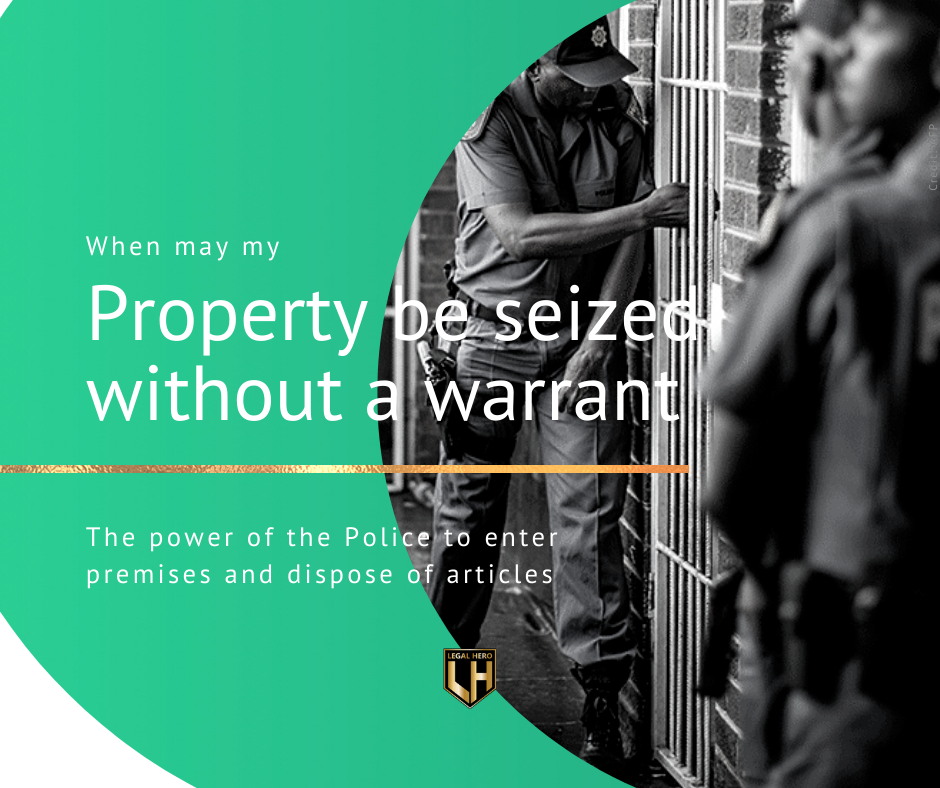
When may my Property be seized without a warrant?
By Jolane van der Walt-Nieuwoudt (LLB) (LLM)
The right to privacy is a cornerstone of individual freedom, protected by Section 14 of the Constitution of the Republic of South Africa. However, the delicate balance between this right and the state’s duty to maintain public safety is exemplified in the complex interplay between Section 14 and Section 36 of the Constitution.
Section 14 of the Constitution unequivocally grants every person the right to privacy, emphasizing the sanctity of personal space and property. However, Section 36 recognizes the need for limitations on rights in certain circumstances, provided such limitations are reasonable and justifiable in an open and democratic society based on human dignity, equality, and freedom.
Warrantless Searches under the Criminal Procedure Act
The Criminal Procedure Act outlines the procedures law enforcement officers must follow when conducting searches and seizures. While a warrant is required, exceptions exist under Section 22, allowing police officials to proceed without a warrant in specific situations.
- Consent
Section 22(a) permits a warrantless search if the person involved consents to it. However, this consent must be informed, voluntary, and with an understanding of the search’s purpose.
- Reasonable Grounds
Under Section 22(b)(i), a police officer may conduct a search without a warrant if there are reasonable grounds to believe that obtaining a warrant is likely, and the delay in obtaining one would defeat the purpose of the search. This requires an objective assessment based on evidence presented.
- Delay in Obtaining a Warrant
Section 22(b)(ii) allows for a warrantless search if a delay in obtaining a warrant would render the search futile. This provision recognizes the practical challenges law enforcement may face in preserving evidence.
Warrantless Searches at Roadblocks
The South African Police Services Act 68 of 1995 empowers the National or Provincial Police Commissioner to authorize roadblocks at which individuals and vehicles may be searched. Section 22 of the Criminal Procedure Act is also applicable at roadblocks, extending the circumstances under which law enforcement can conduct searches without a warrant.
Written Authorization
Any member of the South African Police Service may, without a warrant, search any vehicle at a roadblock. However, this search can only be conducted upon the written authorization by the National or Provincial Police Commissioner, and you have the right to request to view this authorization.
Disposal by police official of article after seizure
Upon seizing an article, such as perishable goods or suspected stolen property, officers must navigate various options outlined in Section 30 of the Criminal Procedure Act. Perishable items may be disposed of considering the interests of relevant parties, while stolen property, with consent, may be returned to the rightful owner, albeit with a requirement to hold it for potential criminal proceedings. If an article isn’t disposed of or returned, it must be marked for identification and retained in police custody, highlighting the importance of proper documentation and storage in law enforcement procedures.
Forfeiture of article to State
Further, Section 35 of the Criminal Procedure Act addresses the forfeiture of articles to the state upon conviction or clearance of charges. Courts hold the authority to declare certain items forfeited if they were used in the commission of an offense or are inherently illegal, such as forged documents or contraband. Notably, exceptions exist to protect individuals who were unaware of the illicit use of seized articles, safeguarding their lawful possession rights. These provisions serve to uphold fairness and due process within the criminal justice system, ensuring that seized articles are handled appropriately, whether through disposal, return, or forfeiture to the state.
In conclusion, the legal framework governing warrantless searches in South Africa reflects a delicate balance between individual privacy and the state’s duty to maintain public safety. Consequently, only in certain limited circumstances, may the police search and seize your property without a warrant.



